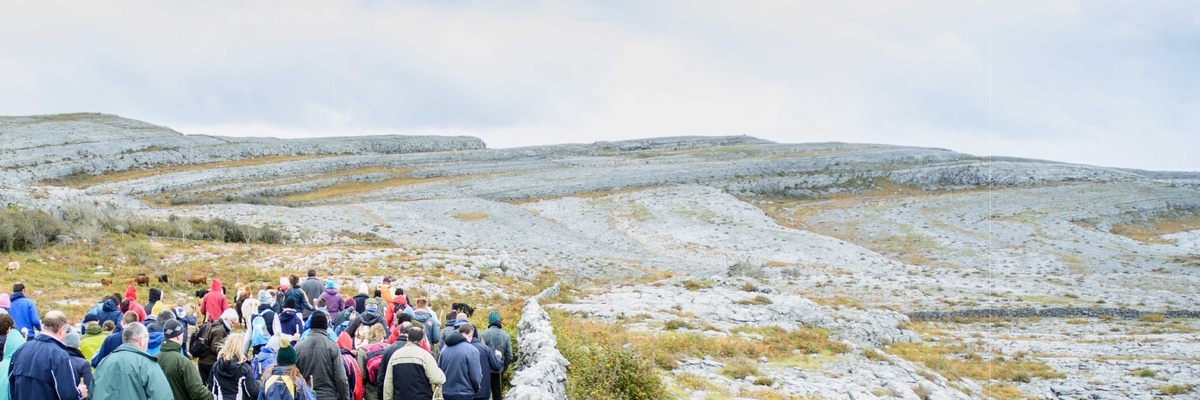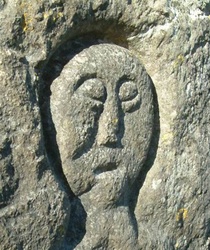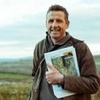Identify and Invite Leaders
Identify and invite 12 locally-based experts (including farmers), or experts on local themes. Ideally, try to source a range of leaders who can cover a broad spectrum of 'heritage' themes including geography, flora, fauna, archaeology, history, culture etc. Local tour guides, farmers, teachers, lecturers, heritage specialists are a good source of leaders – your County Heritage Officer would be a good source for contacts for leaders. Burrenbeo can also provide suggested contacts of heritage experts to get your series kick-started.
Try to get leaders who are good, clear communicators and who can relate to and be aware of their local audience – this should not be a ‘lecture’ but an engaging and informative experience for all present. Give 'new' experts a chance, this can be very empowering – sometimes you may need to reassure them that you will be there to support them should they need it. If speakers need powerpoint/keynote presentations, have a laptop, projector and screen/white wall available (see more info on this in step 3)
Timings
For summer walks, choose a consistent day and time every month from April to September - for example, Burrenbeo holds its walks the 1st Sunday of the month at 2pm. For winter talks, choose a consistent day and time every month from October to March – in Burrenbeo’s case it’s the 1st Wednesday of the month at 8pm. Walks should last 2-3hrs max. Talks should last 35- 45 mins with 15-30min for questions and answers. Expect to begin 10-15 minutes late but do not delay any longer (be conscious of people’s time).
Winter Talk locations
The local community hall can be an ideal space – try to make it nice and cosy if you can. If using an alternative community location, make sure it is 'familiar' for locals and is family friendly. Have a kettle on the boil at least thirty minutes before the talk begins, ask people to bring a few snacks (cakes, biscuits) for the next event – just make sure you have the basics (tea, coffee, milk and sugar) ready. Typically this can provide a great opportunity for people to socialise and get to know one another. Ensure there is always someone there (c. 1 hour beforehand) to get the venue ready in time for the talk. As it will be winter, ensure the venue has some heating – it doesn’t have to be glamorous, it just has to be practical and welcoming. Remember that you will also need someone to help clearing up afterwards – moving chairs, washing up – so ask for some helpers on the night if necessary.
Summer Walk locations
Agree and check out an accessible meeting point with ample parking. Get OS co-ordinates and make detailed directions to the chosen site. Try to find sites which offer access to all-comers but be clear in advertising how strenuous the walk is likely to be so that people are forewarned. If you are using public property for the walk, make sure you get permission beforehand from the relevant authority – NPWS, OPW etc – they are usually delighted to facilitate local access to their heritage sites – you may need to explain that the event is non- profit making. If the walk is on private farmland, get permission from local farmers and encourage them to join the walk and contribute to the conversation if possible. Include any national trails in the local area as possible routes – many local people may not have walked these routes previously. In addition to specifying how strenuous the walk is, make sure that you suggest people have appropriate clothing and footwear. Check whether dogs are allowed at the walk locations and always give prior notification about this to avoid disappointment. Ideally you should have a friend or colleague to help as sweeper at the back of the group – in case some are slower than others.
Finance
Events should be donation-based (e.g. €5, kids free) but it should be made clear that money is not a barrier to participation and that nobody is ‘profiting’ from the events. Use any money raised to cover any receipted costs, such as tea/coffee insurance, equipment and heating costs. Consider using the balance to organise a final ‘celebratory’ event or donate to a local charity (if the latter, make sure this is publicised). Travel and subsistence should be offered to event leaders, but no payment for time should be offered (remember this is a non-profit community initiative). Keep a record of all payments and lodge money in a Credit Union Account rather than holding cash. Initial costs include a projector, screen and laptop for the talks. Some venues may already have these, in other cases they may be borrowed from local organisations. If not, funding from local development groups may be available – LA21 funding for example. In any case, this should not represent a barrier.
Insurance
Check required insurance. Walks can be kept to state owned land, however permission may be required. Privately owned land may have its own public liability insurance. There could be a possibility to tie in with a local walking group or Tidy Towns that may have public liability insurance. Again local development groups may have funds available to help with this. Have someone with First Aid Skills and basic kit. Always have someone 'sweeping' at the back of the group. Most farmers have Public Liability Insurance but will feel more reassured if the group itself is insured.
Advertise and Promote the Series
Use a simple Poster Template - insert relevant image, date, title, leader, meeting point – print a few copies out and post at a few key locations (post office, shop, church, pub etc). Share poster on your ChangeX local page and also on Facebook, Twitter and Local Websites. The Parish Newsletter and local press are terrific ways to get the word out – just send them a short press release with your contact details. Local Radio will usually offer free interviews to walk leaders/speakers if requested - ask the leader to be available to local media the week beforehand to help promote. Ask your friends to come along, make some calls, the direct ask always works best to get things started, then, once hooked, ask them to spread the word. Be available on mobile/by email for few days before event to answer queries. If events are attracting too many people (especially walks where over 30 people can make it difficult to manage), you could consider using an online pre-booking system such as Eventbrite.
Hold your first walk/talk and go from there!
On the day of the walk/talk make sure there is someone at the venue an hour before the start time to make sure everything is ready. For a talk make sure the laptop and screen are set up properly and put on the kettle ahead of time. When people start to arrive, make sure that you have a register sheet to record names and contact details – particularly email addresses for notice of future events. You should say a few words of welcome to the audience and introduce the speaker, and wrap up by thanking the speaker and audience and advertising the next event. During the walk/talk remember to take photos and post on your ChangeX page - show people what is happening!
To lessen the load on you, consider having a small, informal, organising committee (3 people). As the year goes on, identify one or two people who you feel might be willing and able to continue your role after the year has ended. Feedback your progress to Burrenbeo – your schedule of events, the turnout, any feedback including ideas of how the proposal could work better. This will help Burrenbeo to help others.









 "Welcome to Local Explorers - a simple and fun way to discover more about your local heritage and get to know your community! Below you'll find all the information you need to get started! "
- Brendan Dunford, Burrenbeo Trust
"Welcome to Local Explorers - a simple and fun way to discover more about your local heritage and get to know your community! Below you'll find all the information you need to get started! "
- Brendan Dunford, Burrenbeo Trust
